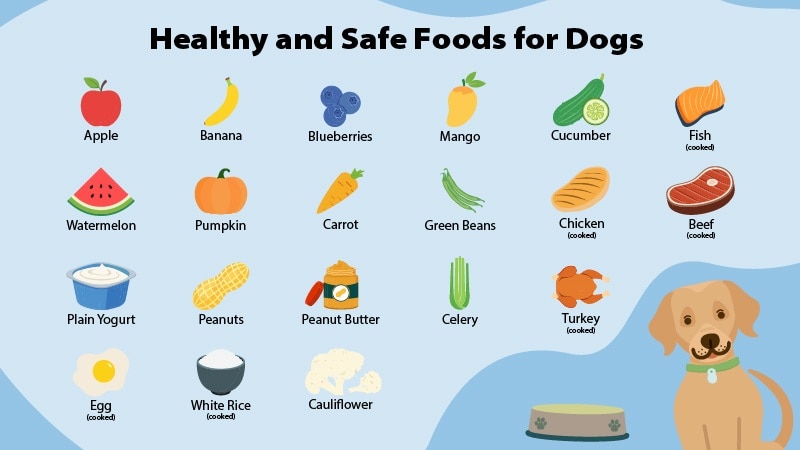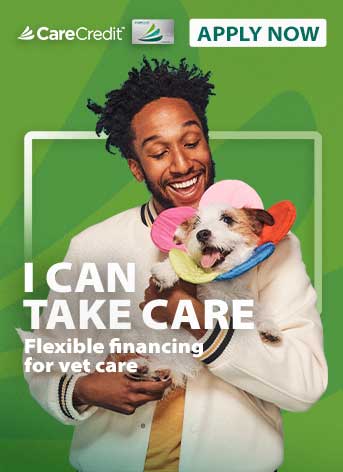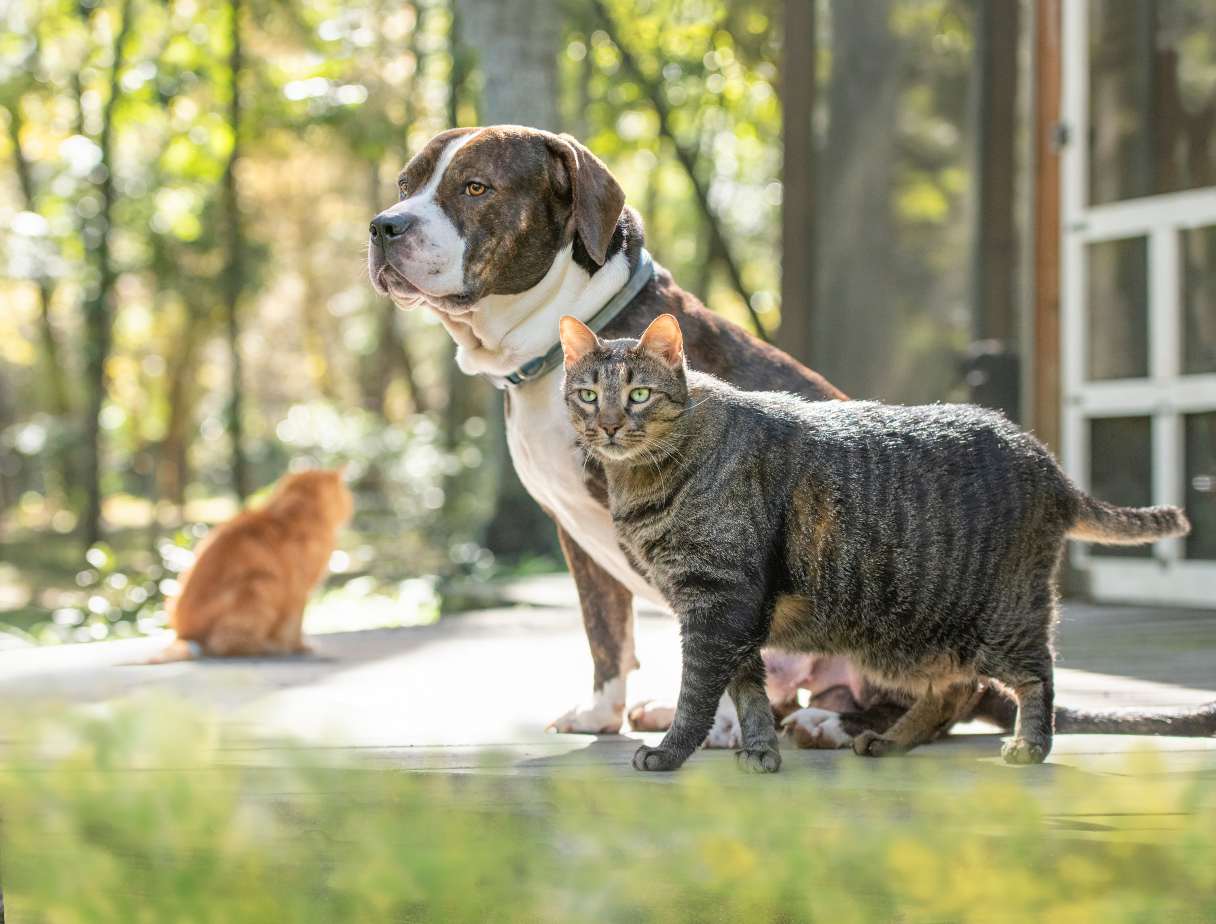Let's be honest: We're all guilty of sneaking our pups a little human food off our plates here and there, right? While many of the things people eat are safe for dogs, our pups have a different digestive system and nutritional needs, so people foods aren't always the best choice for our four-legged friends.
The good news is that there are plenty of dog-friendly meats, fruits and veggies that are wonderful snacks for dogs. Whether you're looking for some healthy dog treats or want to supplement your dog's existing diet with some whole foods, here are some of the best options for your dog that are good for them — and good for you, too!
Important note: Just like with humans, give your dogs these foods as treats in small or moderate amounts. Treats should only make up about 10% of your dog's diet, even if their treats are mostly from the list below. Also, just because something is healthy for dogs doesn't mean your dog will enjoy or tolerate it. If your dog reacts to any food, stop feeding it to them and call your veterinarian.
Some human foods can be toxic to dogs. Find a complete list on the American Society for the Prevention of Cruelty to Animals® (ASPCA®) website, and if you suspect your dog has ingested something toxic, call your veterinarian or the ASPCA Animal Poison Control Center immediately.

1. Apples
Fresh apples are a wonderful, crunchy snack for dogs — as long as you remove the seeds. The fruit is a good source of vitamins A and C, as well as fiber, which is important for digestive health.
Vitamin A supports the immune system, assists in bone growth and promotes skin health. It helps maintain vision, too. Meanwhile, vitamin C can reduce inflammation, boost immunity and help with cardiovascular function.
2. Bananas
Bananas are a tasty treat and well-suited for older dogs who may have fewer or more sensitive teeth, since this fruit is easy to chew. Bananas have tons of health benefits, including helping to reduce blood pressure and promoting overall heart health.
The fruit is also filled with:
- Fiber (aids in digestion)
- Folate/vitamin B9 (contributes to healthy cell growth)
- Lectin (improves blood sugar and intestinal health)
- Potassium (helps with fluid balance and kidneys)
- Tryptophan (an essential amino acid for regulating the sleep-wake cycle, appetite, mood and pain)
- Vitamin C (immune booster)
3. Beef (Cooked)
Beef is a nutritious protein source that has all of the essential amino acids, plus vitamins and minerals. If you choose to give your dog beef, make sure it’s fully cooked to avoid any bacteria, and choose grass-fed cattle if possible — they’re a better source of good fatty acids than grain-fed cattle.
4. Blueberries
Blueberries (or deep-purple berries, depending on who you ask) are a tasty treat for humans and dogs alike. They are a rich source of vitamins and antioxidants — like vitamins C, K and A, which may reduce the likelihood of diseases, disorders and age-related issues.
5. Carrots
Carrots can be a great treat for dogs. The crunchy texture can help remove plaque from their teeth, and the orange root vegetable is also a good source of vitamin A.
Cold or frozen carrots can also be helpful for teething puppies, giving them something to chew on and easing discomfort. However, carrots can be a choking hazard for young dogs, so it's important to cut them into small, manageable pieces to avoid any problems.
6. Cauliflower (Unseasoned)
Low in calories and packed with nutrients like fiber, antioxidants, folate, pantothenic acid, potassium, magnesium, manganese, phosphorus, choline, sulforaphane and vitamins C, K and B6, cauliflower is a great way to supplement your dog’s regular diet. Despite all of its benefits, cauliflower can make your dog gassy, so keep this treat restricted to small amounts. It’s safe to share with your pup raw or cooked, just make sure it’s unseasoned.
7. Celery
If you’ve got a chunky pup (no judgment — it happens to the best of us!), celery could be your dog’s next go-to treat. Celery is low in fat and is a good source of fiber and vitamins A, C and K. It's also packed with folate, potassium and manganese, which promotes healthy metabolism, and it may even help freshen your pet’s breath.
However, celery can be a choking hazard. Prevent any problems by chopping the veggie into bite-sized pieces, especially for smaller dogs.
8. Chicken (Cooked and Unseasoned)
If your dog has an upset stomach, chances are your vet will recommend feeding them plain, boiled chicken and rice (one good way to present it is as a meat topper to your dog's kibble).
It's easily digestible, high in protein and low in fat. However, since dogs are omnivores and require a balanced diet beyond just meat, it's best to offer this as a supplement or treat rather than a primary food source. And never give your dog chicken bones (especially cooked) — they can splinter and damage your dog's gastrointestinal (GI) tract.
9. Cucumbers
Similar to celery, cucumbers are a low-calorie, sodium- and fat-free crunchy treat that your dog may love. However, also like celery, this vegetable can be a choking hazard, so be sure to cut them into bite-sized pieces for your four-legged family member.
10. Eggs (Cooked and Unseasoned)
Eggs are a good source of protein and are high in many vitamins, including vitamins A, B, D and K. Other important nutrients include selenium, calcium and zinc — all of which contribute to a super healthy treat for your dog. Make sure to cook them well as raw eggs can contain salmonella. Your dog may like scrambled eggs, or even a hard-boiled egg, as a compliment to their regular diet.
11. Fish (Cooked and Unseasoned)
Fish, especially salmon and sardines, are rich in protein and amino acids, while also being a good source of omega-3 fatty acids. An added benefit of sardines is that their soft bones offer a valuable boost of calcium.
Note: Sardines are the only fish you can leave the bones in; otherwise, it's important to remove all fish bones before feeding fish to your dog. Always fully cook fish and limit your dog's intake to no more than two servings per week.
12. Green Beans
Green beans are one of the best foods on this list for overweight dogs because they are low in calories and fat. This veggie is also a good source of fiber and vitamin C. You can feed your dog cooked green beans or give them frozen beans for a crunchy snack.
13. Mango
Don’t keep this delicious tropical fruit to yourself — it’s high in fiber and vitamins A, B6, C and E, making it a fantastic sweet treat for humans and dogs. Always remove the pit and peel, as both could make your dog sick. Additionally, too much mango could cause stomach issues, so this is one item on the list to give in moderation.
14. Peanuts (Unsalted) and Peanut Butter
Peanuts are a safe nut for dogs to eat, as long as they are unsalted. They have good fats and protein, but too much fat can lead to issues like weight gain or pancreatitis. Peanut butter has the added benefits of vitamins B and E, as well as fiber, all of which are good for cardiovascular and digestive health. Just make sure that the peanut butter doesn't contain xylitol, a sugar substitute that is toxic to dogs.
15. Pumpkin
Pumpkin is a fantastic supplement to any dog's diet: It's rich in nutritional value (vitamins A, C and E, plus minerals like iron and potassium) and has high soluble fiber content, making it great for your dog's digestion and helping with tummy issues like diarrhea or constipation. It's high in prebiotics, too, which support the digestive tract.
Pumpkin is low in calories and can be an excellent addition to your dog's regular food. Always make sure that if you are buying your dog canned pumpkin it is pure pumpkin — not pumpkin pie filling with dangerous-for-dogs additives.
16. Turkey (Cooked and Unseasoned)
Like chicken, turkey is a good source of protein. Be sure to remove the skin, bones and fat. And any turkey you give your dog should be fully cooked and unseasoned.
17. Watermelon
Anyone who has taken a bite of a watermelon and immediately felt the juices running down their chin knows that the fruit is a delicious way to stay hydrated in the summer. It's also a good source of vitamins A, C and B6. Remove the seeds and rind before giving watermelon to your dog.
18. White Rice (Cooked)
Cooked white rice is often recommended for dogs needing a bland diet for a few days. It's easy to digest and helps firm up stool. However, since rice can cause a spike in blood sugar, dogs with diabetes should only eat small amounts. Your vet can help you determine how much rice, if any, your dog should consume.
19. Yogurt (Plain)
Some dogs have difficulty digesting dairy products, but plain yogurt can be a wonderfully healthy treat for your dog, as probiotics can help strengthen your dog's digestive system. However, don't give your dog yogurt with any added sugar or artificial sweeteners.
CareCredit Credit Card Financing for Dogs
Taking good care of your pet's well-being from nose to tail is essential. Make sure to stay up to date on their regular checkups at the vet to help keep your pet happy and healthy for a lifetime of love. You can use your CareCredit credit card for pet care throughout the year for routine veterinary services as well as emergencies and surgeries.* Use our Acceptance Locator to find a veterinarian near you that accepts CareCredit.
CareCredit is there for you and your pet every step of the way; continue your wellness journey by downloading the CareCredit Mobile App to manage your account, find a provider on the go and easily access the Well U blog for more great articles, podcasts and videos.
In addition to pet care, you can also use your CareCredit credit card for dentistry, cosmetic, vision, hearing, health systems, dermatology, pharmacy purchases, spa treatments and so much more within the CareCredit network. How will you invest in your health and wellness next?
Expert Reviewer
Dr. Kathy Wiederkehr (Wentworth), V.M.D.
Dr. Kathy Wiederkehr (Wentworth) has been practicing veterinary medicine at pet care facilities in California since 2001. Most recently, she served as medical director of the VCA PetPoint Medical Center and Resort in Irvine. She is a graduate of the University of Pennsylvania School of Veterinary Medicine and became board-certified as a diplomate in Canine and Feline Practice by the American Board of Veterinary Practitioners in 2010.
Author Bio
Abbie Mood is a freelance writer with more than 15 years of experience. She has worked with clients of all sizes to create compelling content and has written for the American Kennel Club, Marriott Bonvoy, Women’s Health Online, Headspace and more.








